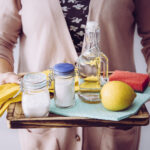Consumer products are a silent source of cancer-causing chemical exposure, NEW study reveals
 (NaturalHealth365) When consumers make a purchase, they often prioritize utility and aesthetics, rarely considering the possibility of harmful chemicals lurking in the products they choose. However, recent analysis has highlighted a concerning issue: certain consumer products contain cancer-causing volatile organic compounds (VOCs).
(NaturalHealth365) When consumers make a purchase, they often prioritize utility and aesthetics, rarely considering the possibility of harmful chemicals lurking in the products they choose. However, recent analysis has highlighted a concerning issue: certain consumer products contain cancer-causing volatile organic compounds (VOCs).
Exposure to these chemicals poses a significant risk, potentially leading to cancer and other detrimental health effects. It’s crucial for consumers to be aware of this hidden danger and take proactive steps to protect their well-being.
Cancer-causing VOCs in consumer products everyone should be aware of
The results of an extensive analysis involving over 170 categories of consumer products are alarming. Among these products, a staggering 105 were found to contain harmful chemicals with potentially serious consequences for our health.
The most common culprits identified in these products include
- N-methyl-2-pyrrolidone
- Formaldehyde
- Diethanolamine
- Methylene chloride
While these chemicals’ toxic and cancer-causing nature is well-known, they continue to be used widely across the United States.
Curiously, diethanolamine, which has been banned from use in cosmetic products throughout the European Union and Canada, still finds its way into shampoos available in the U.S. This ingredient, despite its potential to react with other substances and create a toxic and potentially cancerous combination, is employed to achieve the desired foamy texture in personal cleaning products.
Consumer products have the potential to cause more than cancer
The presence of VOCs in consumer products goes beyond the risk of cancer and extends to a range of other concerns. These harmful chemicals can give rise to a multitude of problems, including developmental harm, reproductive harm, and disruption of the endocrine system.
Moreover, VOC-laden consumer products can potentially contribute to the development of asthma, a respiratory condition affecting millions of people worldwide. The inhalation of these compounds can trigger or exacerbate asthma symptoms, making it even more crucial to address the issue of VOCs in everyday products.
Safeguard your health: Steer clear of products with harmful VOCs
When it comes to everyday consumer products, a closer look is warranted to protect our well-being. Unfortunately, many cleaning, personal care, and cosmetic items harbor harmful volatile organic compounds (VOCs) that pose potential risks. From popular shampoos, cleaning solutions, and body lotions to unexpected culprits like mothballs, these products can release VOCs into the air within our households. The issue extends to nail polishes, paint removers, adhesives, and beyond.
To ensure a healthier living environment, it’s essential to be cautious of products containing VOCs. Here are some additional examples of common consumer items known to harbor these harmful compounds:
- Detergents
- Degreasers
- Sanitizers
- Lubricants
- Vehicle care products
- Caulks
- Cleansers
- Art supplies
- Sealants
- Hair straightening products
- Skin lightening products
Take charge of your health and make empowered consumer choices
As a conscious consumer, it’s crucial to be aware of potentially harmful chemicals lurking in the products we purchase. To protect yourself, consider these steps:
Research and avoid: Take the time to educate yourself about the products most likely to contain VOCs. By identifying and avoiding these items to the best of your ability, you can reduce your exposure to these potentially harmful chemicals.
DIY alternatives: If you’re up for the challenge, explore the world of do-it-yourself personal care products. By creating your own using all-natural ingredients, you have full control over what goes into them, ensuring a safer option for you and your loved ones.
Raise your voice: Exercise your personal power by petitioning government regulators and manufacturers to prioritize the removal of harmful chemicals from consumer products. By voicing your concerns and advocating for change, you contribute to the collective effort of improving product safety.
Take the first step in becoming an informed consumer, and let your voice be heard. Together, we can drive positive change and create a safer, healthier future for all of us.
Editor’s note: To learn more about how to protect your health with more natural personal care products and household cleaners – read this article on NaturalHealth365.
In addition, Get the Best Non-Toxic Laundry Wash – Huge Savings Here.
Sources for this article include:



